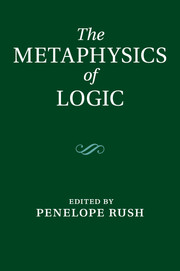Book contents
- The Metaphysics of Logic
- The Metaphysics of Logic
- Copyright page
- Dedication
- Contents
- Contributors
- Introduction
- Part I The Main Positions
- Chapter 1 Logical realism
- Chapter 2 A defense of logical conventionalism
- Chapter 3 Pluralism, relativism, and objectivity
- Chapter 4 Logic, mathematics, and conceptual structuralism
- Chapter 5 A Second Philosophy of logic
- Chapter 6 Logical nihilism
- Chapter 7 Wittgenstein and the covert Platonism of mathematical logic
- Part II History and Authors
- Part III Specific Issues
- References
- Index
Chapter 3 - Pluralism, relativism, and objectivity
from Part I - The Main Positions
Published online by Cambridge University Press: 05 October 2014
- The Metaphysics of Logic
- The Metaphysics of Logic
- Copyright page
- Dedication
- Contents
- Contributors
- Introduction
- Part I The Main Positions
- Chapter 1 Logical realism
- Chapter 2 A defense of logical conventionalism
- Chapter 3 Pluralism, relativism, and objectivity
- Chapter 4 Logic, mathematics, and conceptual structuralism
- Chapter 5 A Second Philosophy of logic
- Chapter 6 Logical nihilism
- Chapter 7 Wittgenstein and the covert Platonism of mathematical logic
- Part II History and Authors
- Part III Specific Issues
- References
- Index
Summary
Information
- Type
- Chapter
- Information
- The Metaphysics of Logic , pp. 49 - 71Publisher: Cambridge University PressPrint publication year: 2014
Accessibility standard: Unknown
Why this information is here
This section outlines the accessibility features of this content - including support for screen readers, full keyboard navigation and high-contrast display options. This may not be relevant for you.Accessibility Information
- 1
- Cited by
